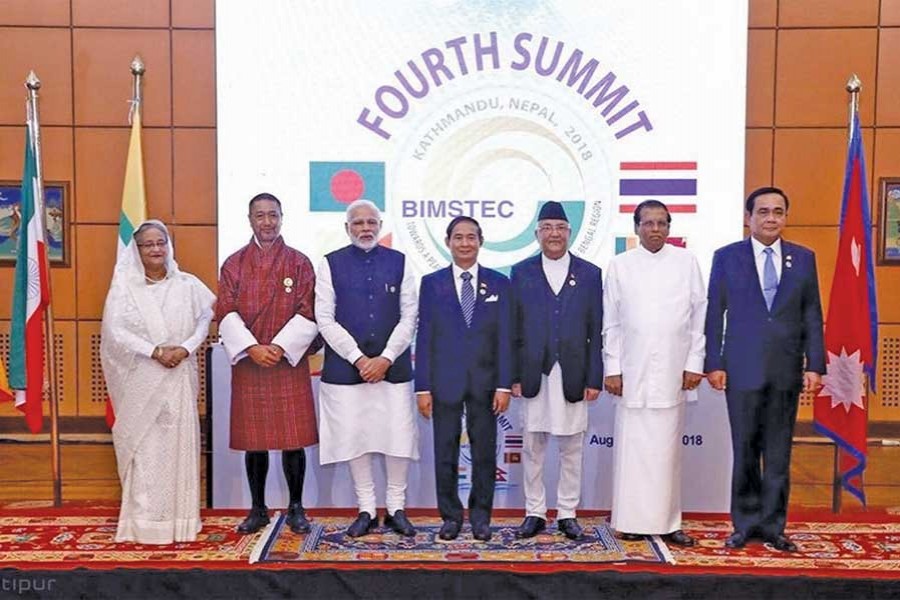
Published :
Updated :

Participated by the heads of states and governments and representatives of South Asia and Southeast Asia, the fourth summit of the Bay of Bengal Initiative for Multi-Sectoral Technical and Economic Cooperation (BIMSTEC) was held in Kathmandu on August 30-31. Repeatedly deferred, it took place four years after the previous summit held in Myanmar in 2014. The key theme of the Kathmandu summit was: "Towards a peaceful, prosperous and sustainable Bay of Bengal region."
The BIMSTEC was launched in June 1997 for regional cooperation and economic integration. It now comprises seven nations namely, India, Bangladesh, Bhutan, Myanmar, Nepal, Sri Lanka and Thailand. Two member countries of the South Asian Association for Regional Cooperation (SAARC), Pakistan and Maldives, were left out in the cold.
A least integrated region, BIMSTEC has an estimated 22 per cent of the total global population. Its combined Gross Domestic Product (GDP) is around $ 2.8 trillion. Analysts believe that deeper economic integration will lead to huge benefits and help sustain development of the member countries.
BIMSTEC emphasises 14 areas of cooperation for achieving rapid socio-economic development. Its guiding principles are: respect for sovereign equality, territorial integrity and political independence, non-interference in internal affairs, peaceful co-existence and mutual benefit.
A day before the commencement of the fourth summit, the foreign ministers from the BIMSTEC nations met and decided in principle to approve numerous connectivity-related projects under an ambitious $50-billion BIMSTEC Transport Connectivity Master Plan. It was revealed that quite a few multilateral donor agencies have shown interest to finance the projects.
The issue of regional connectivity dominated the Kathmandu BIMSTEC summit. Most leaders stressed the need for enhancing multi-dimensional connectivity among the member states. This conforms to the belief that besides trade facilitation, better connectivity will significantly boost regional trade by decreasing transportation time and trade expenses.
Thus, while opening the summit, Nepalese Prime Minister KP Sharma Oli said, "Connectivity is a key enabler for robust regional cooperation. It is the very foundation, in which the edifice of economic integration can stand upright." He stressed that member states need to substantially increase investments in the regional transport network sector. In fact, connectivity in roads, airways, waterways and transmission lines has the power to streamline the development of the region.
KP Oli also underscored that "An early conclusion of the agreements on trade in goods, trade in services, investment, and mutual assistance in customs matters, dispute settlement and trade facilitation is the need of the hour to enable BIMSTEC to effectively move forward." The sooner these thorny issues are decided, the better for the BIMSTEC.
In her address, Prime Minister Hasina said that while BIMSTEC achieved a few modest successes in the past 21 years, a massive task was lying in front of its members. PM Hasina asserted, "We need to consolidate fundamental legal frameworks to carry forward the substantive engagements in our cooperation to produce visible results."
The Indian Prime Minister Narendra Modi in his address said, "India is committed to working with the BIMSTEC member states to enhance regional connectivity and combat the menace of terrorism and drug trafficking." The most important upshot of the summit is the signing of a memorandum of understanding (MoU) on the establishment of the BIMSTEC Grid Interconnection to promote energy cooperation among the member-states. Indeed, early implementation of the electricity grid connectivity is crucially important. Energy security is essential for accelerating the rate of economic growth and development. However, the summit could not make any progress in matters of Free Trade Agreement (FTA) in goods and services.
The Fourth BIMSTEC summit issued an 18-point Kathmandu Declaration. The Chairmanship of the BIMSTEC was assigned to the Sri Lankan President Maitripala Sirisena.
The Kathmandu Declaration highlighted the issue of combating terrorism. The leaders strongly deplored terror attacks anywhere in the world including in BIMSTEC nations and condemned terrorism in all its forms and manifestations and emphasised that such acts can't be justified. The Declaration said: "Affirm that the fight against terrorism should target not only terrorists, terror organisations and networks, but also identify and hold accountable States and non-State entities that encourage, support or finance terrorism, provide sanctuaries to terrorists and terror groups and falsely extol their virtues."
But the summit was silent on the lingering Rohingya crisis. It did not mention Myanmar's military crackdown which the UN and others termed as "ethnic cleansing." In fact, the Myanmar government flouted BIMSTEC's own guiding principle which underscores "peaceful co-existence" and coherence among the member-states.
Dr. Kamal Uddin Ahmed is a former Professor and Chairman, Department of Political Science, University of Dhaka.


 For all latest news, follow The Financial Express Google News channel.
For all latest news, follow The Financial Express Google News channel.